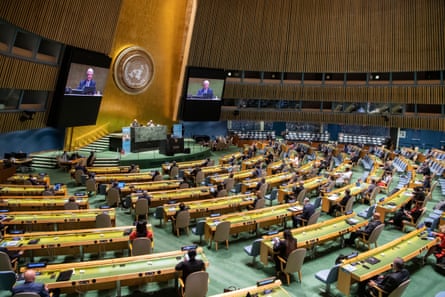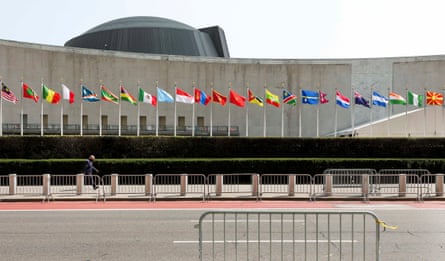
It has been billed as the world’s worst Zoom meeting, but the United Nations’ 75th general assembly could be even worse than that.
It is called the “general debate” but, unlike a Zoom meeting, there will be no discussion – just a week-long procession of pre-recorded video messages from the world’s leaders, stating their positions, very much with their domestic audience in mind. They were supposed to have sent their videos at the end of last week. As of Monday, only half had been turned in.
The UN secretary-general, António Guterres, is hoping to use the organisation’s 75th anniversary as an opportunity for member states to recommit to its founding principles, but the UN and multilateralism itself has never seemed so beleaguered.
“The problem is that much of the world is questioning whether the UN is still relevant at 75,” said Sherine Tadros, the head of the UN office of Amnesty International. “To use a Covid analogy, it’s a matter of whether it’s got too many underlying pre-existing conditions to make it through this next period.”
On Tuesday morning, Jair Bolsonaro’s presentation will be followed by Donald Trump, then Recep Tayyip Erdoğan and Xi Jinping. Vladimir Putin’s turn comes about half an hour later. The “high-level week” will begin with a parade of the world’s self-styled strongmen.
According to the latest running order, 50 men will address the assembly before the first woman gets a chance to speak, Slovakia’s Zuzana Čaputová.
The speeches will be introduced by each country’s representative from their seat in the vast general assembly chamber and then the leader’s lecture will be displayed on giant screens set up behind the famous green marble podium where the speeches were delivered on the previous 74 general assemblies, in pre-Covid times. The speakers are allowed to use video graphics and some have availed themselves of the opportunity, according to UN diplomats.
Quick Guide
Crunch points at the UN general assemblyShow
Because the summit does not involve the hassle of traveling to New York, there will be more heads of state and government speaking than usual (Putin and Xi normally gives it a miss) but there will be no opportunity for them to rub shoulders.
All the worst parts of UN events will be on display, the endless speechifying first among them, but none of what normally makes the general assembly indispensable - the opportunities from face-to-face meetings and impromptu conversations.
“I think part of what will be lost is that when people are speaking inside the general assembly hall, they’re speaking to other world leaders. But with these recorded speeches, they will be targeting their domestic audience,” said Ashish Pradhan, the senior UN analyst at the International Crisis Group.
 Flags outside of the general assembly hall at UN headquarters in New York. Photograph: Justin Lane/EPA
Flags outside of the general assembly hall at UN headquarters in New York. Photograph: Justin Lane/EPA“With a few exceptions, Trump’s speech and a few others listening to adversaries, I wonder how many world leaders will even be listening to the other speeches.”
This is a particularly bad moment for creative in-person diplomacy to go missing. At the same time as the coronavirus pandemic, the rift between the US and China has come to dominate global politics and contribute to the paralysis of the UN security council as a decision-making body on international crises.
Seeking to bolster sagging spirits on Monday, Guterres pointed out that: “Never in modern history have we gone so many years without a military confrontation between major powers.”
But even that achievement is under threat as Indian and Chinese soldiers skirmish on their disputed Himalayan border.
The council has often been divided on policy. It is now divided on the nature of reality. The US is currently insisting that it has triggered the reimposition of UN sanctions on Iran. Almost every other member state, including 13 of the 15 members of the security council, say that is not the case, and they are pointedly ignoring the pronouncements being made on the issue from Washington.
The US envoy to the UN, Kelly Craft, shrugged off her country’s isolation, declaring: “We do not need a cheering section to validate our moral compass.”
Trump’s speech is anticipated with even more foreboding than usual this year, as he approaches the November election seeking to burnish his “America First” credentials.
In May he announced he was severing all ties with the World Health Organisation (WHO), which is trying to make a scapegoat for the pandemic. Some fear he will go further on Tuesday, and threaten cutting off more US funding to the UN, if it does not fall into line with the administration’s efforts to isolate Iran.
Trump told journalists that he had taped his message on Monday afternoon and that it contained “a strong message on China”. It is also likely to have been infused with vitriol for Iran and the WHO. The counterpoint will almost certainly be an account of his recent diplomatic flurry, brokering agreements on the normalisation of relations between Israel and two of the Gulf monarchies, the United Arab Emirates and Bahrain, and the staging of an economic agreement between Serbia and Kosovo, which Trump has described as “stopping mass killings”.
One concrete achievement from the virtual world summit that Guterres hopes to deliver is added momentum to Covax, the international joint effort to develop a Covid-19 vaccine.
“I think the speeches might provide an opportunity for governments to pledge their support to the Covax facility,” Mark Leon Goldberg, the editor of the UN Dispatch blog and host of the Global Dispatches podcast. By Monday, 156 countries had agreed to a deal for equitable distribution of any future vaccine.
The Covax initiative is likely to be one relatively bright spot in an otherwise dark week. The Trump administration has said it will have nothing to do with the Covax project, and its broader offensive against multilateralism, compounding Russia and China’s customary role as spoilers on concerted UN against disasters and atrocities, risks leaving permanent damage.
“In the end, the UN is a microcosm of the world,” Tadros said. “So when we say the UN is broken, that’s not about the building. It’s not about the nuts and bolts. It’s a reflection of what’s going on around the world.”
No comments:
Post a Comment